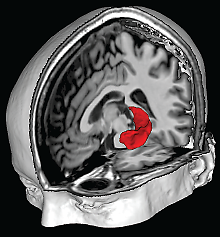When it comes to the hippocampus, the brain’s memory center, size appears to be an issue. Research studies have shown connections between smaller hippocampal volume and mental health issues such as depression and cognitive defects in later life. A new study may have now found one culprit behind hippocampal shrinkage, and it’s a protein that helps regulate blood pressure.
A team led by researchers at Duke University Medical Center identified four variants in a gene called AGTR1 that were associated with accelerated hippocampal loss and, to a lesser extent, memory problems. AGTR1 makes a protein that is a pivotal receptor in the renin-angiotensin system, a hormonal network that regulates blood pressure as well as how people respond to stress and anxiety.
“When people think of blood pressure, they associate that with the heart and maybe the kidneys, but we need to appreciate the role of the vascular system in relation to the brain,” said Warren Taylor, M.D., an associate professor of psychiatry at Vanderbilt University School of Medicine and one of the study authors. “The brain needs a steady flow of blood as much as any other organ.”
Taylor and his colleagues collected genetic information from 138 volunteers aged 60 and over and then monitored the group for about four years, conducting periodic psychological assessments and brain scans using magnetic resonance imaging (MRI).
Three AGTR1 variants, also known as single nucleotide polymorphisms (SNPs), correlated with both smaller hippocampal volume and greater volume loss over time. Two of these SNPs were also associated with a reduced ability to recall past events, though other cognitive tests were not influenced by these variants.
“The overarching message would be that genetic variants affecting the angiotensin receptor exhibit parallel effects on hippocampal volume and memory decline.” Taylor said. “In some cases, we also observed a synergistic effect of AGTR1 with the APOE4 genotype, a known risk factor for Alzheimer’s disease, where possessing both risk alleles was associated with greater hippocampal volume reduction.”
The volume changes were nuanced, but detectable enough that they might serve as a biomarker for future risk of depression or memory loss. Scientists have been trying to identify genetic links to psychiatric diseases, but it’s challenging when the outcomes—depression, for example—are so heterogeneous in how they manifest. Hippocampal volume, however, is a tangible and measurable trait, making it a potential proxy for mental health.
How these variants might affect the function of AGTR1 is not known, but Taylor believes that increased activity is the likely scenario; an overactive renin-angiotensin system would increase blood pressure and stress responses and make the brain vulnerable to damage from strokes or inflammation.
The AGTR1 study was published August 15 in AJP in Advance.
Meryl Butters, Ph.D., an associate professor of psychiatry at the University of Pittsburgh Medical Center, is intrigued by the ATGR findings as they reinforce recent findings from her group. They compared blood samples from 80 older adults with remitted depression and found 24 proteins that were present at significantly different levels in depressed adults with some cognitive problems compared with depressed adults with normal cognition.
“All of these proteins boiled down into three basic categories, though,” she told Psychiatric News. “They include cell survival, the immune system and inflammation, and vascular health. We also conducted brain scans and found evidence that older adults with cognitive impairment had more vascular damage than those without cognitive impairment”
Butters’ study, which was published August 5 in Molecular Psychiatry, did not specifically identify AGTR1 or other proteins related to the renin-angiotensin system, but that doesn’t discount their involvement. “We have two studies that asked a similar question from two different angles, and both found a central role for ischemic damage and inflammation in late-life cognitive problems. This is a convergence worth further investigation.” ■
An abstract of “Decreased Motivation During Chronic Pain Requires Long-Term Depression in the Nucleus Accumbens” is available
here. An abstract of “Economic Demand Predicts Addiction-like Behavior and Therapeutic Efficacy of Oxytocin in the Rat” can be accessed
here.


